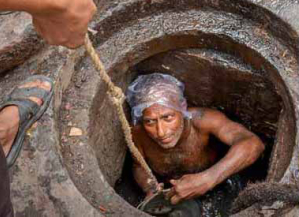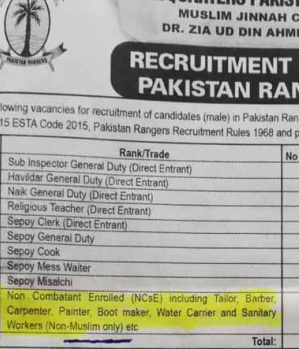
Sanitation workers in Pakistan—many of whom are Christians from marginalized caste backgrounds—face systemic discrimination, hazardous conditions, and caste-based exclusion in public employment, according to a new report by Amnesty International.
The research report, titled “Cut Us Open and See That We Bleed Like Them”, was released on July 28 and documents how sanitation workers across six districts—Lahore, Bahawalpur, Karachi, Umerkot, Islamabad, and Peshawar—are subjected to entrenched caste- and religion-based stigmatization, in violation of both Pakistani constitutional protections and international human rights law.
Amnesty researchers interviewed Christian, Hindu, and Muslim workers to assess the impact of discrimination linked to caste-designated occupations.
Caste- and religion-based discrimination
The report noted that sanitation work in Pakistan is disproportionately assigned to non-Muslims who belong to so-called “lower castes”, often without offering real choices.
This caste- and religion-based marginalization leads to widespread violations of sanitation workers’ fundamental rights—including dignity, life, safety, freedom of association, and access to health and labor protections such as minimum wage, safe working conditions, and fair treatment—despite guarantees under the Constitution of Pakistan and the country’s obligations under international human rights law, the report added.
The report quotes the National Commission for Human Rights (NCHR) that found in its 2022 report that 80 percent of non-Muslim religious minorities are employed in the lowest grades for government jobs.
The situation is even more serious for women sanitation workers who face “triple discrimination” at the intersection of religion, caste and gender. About half of the women included in the report reported workplace harassment.
Stigmatization and risk of accusation of blasphemy
Many Christian workers who took part in the Amnesty study said they had experienced stigmatization, recalling that the majority Muslim community often called them with derogatory and insulting names like “Chuhra” and “Isai”, among others. Many reported that they were not allowed to use the same dishes or eat in the same places as Muslims, while some survey participants stated that they regularly faced discrimination in public places, the report noted.
The report pointed out that stigmatization had also resulted in violence, particularly in the context of blasphemy allegations. It noted that there have been several prominent cases of Christian sanitation workers being accused of blasphemy, including Pakistan’s most high-profile blasphemy victim, Asia Bibi.
In August 2023, a blasphemy accusation against two sanitation workers led to an arson and mob attack on more than 20 churches and 80 Christian homes in Jaranwala, the report added.
Discriminatory job advertisements and opportunities

The report further noted that data collected from nearly 300 government job advertisements from 2010 to March 2025 showed that the ads explicitly required applicants to be non-Muslim or so-called “lower castes” or gave preference to them as part of the job criteria.
This reinforces existing caste-based patterns of employment within sanitation work and ensures that so-called “lower caste” non-Muslims are pushed towards sanitation work, it said.
A man from Bahawalpur told Amnesty researchers how he had gone for a job interview for an electrician position, but when the recruiters found out he was Christian, they only offered him a sanitation job. He ended up accepting the job because he needed an income to support his family, the report stated.
In the analysis of data collected from five government agencies, Amnesty found Christians were disproportionately employed, not only in lower grades, but also specifically in sanitation positions.
Data from the Punjab police force showed that there were 1,909 non-Muslims in the lower 1-5 grade positions, but only 55 in grades 7 to 18. Data from the Punjab Forensic Science Authority showed a similar pattern: 23 Christians employed as sweepers, compared with only 10 Muslims, whereas all other occupations showed Muslims as the majority. Data from the Water and Sewerage Authority revealed that non-Muslims were overrepresented in lower pay scales. Out of the 1,538 non-Muslims employed across all positions in the department, 1,515 (98.5%) non-Muslims worked in grade 1-5 jobs. Additionally, data provided by the University of Punjab showed that out of 400 sanitation workers, only four were Muslim. These figures indicate a correlation between religious identity and occupation, the research noted.
Lack of legal protection
The study also found that sanitation workers in Pakistan can be categorized into three main employment groups: permanent, contractual and daily wage. The government bodies across Pakistan avoided regularizing sanitation workers, denying them job security, benefits and legal protections. Sanitation workers do not fall into the definition of worker under many laws, and if they do, these laws fail to cover temporary and daily-wage workers, the study noted.
It also noted several practices by employers to maintain a non-permanent workforce. First, some employers hire sanitation workers on 89-day contracts to avoid legal obligations under the Industrial and Commercial Employment (Standing Orders) Ordinance that defines a permanent worker as someone who has completed a probationary period of three consecutive months.
Sanitation workers participating in the research were also found to be inadequately protected by social security and welfare schemes and they lacked awareness regarding social service and worker welfare schemes.
Low wages and unsafe working conditions
According to the study, the minimum wage in 2024 was set at 37,000 Pakistani rupees (about $131) per month in most of the country, and at the time of the field research, it was 32,000 rupees (about $113) per month. Almost half of those workers who were part of the research received salaries below the minimum wage. Among those who received a minimum wage, the majority were men.
“Workers across all districts reported that their salaries were insufficient to cover their basic needs,” the study revealed, adding that researchers found that the sanitation workers were regularly subjected to unsafe, and sometimes hazardous, working conditions. Sanitation workers participating in the study seldom received personal protective equipment or training in occupational safety and health, it observed.
Amnesty’s recommendation call for fundamental change
In its recommendations, Amnesty International called for action to address the issues of caste-based discrimination faced by the sanitation workers.
It urged the government and relevant authorities to eliminate the manual cleaning of drains and gutters and instead use machinery; amend the Constitution to include protection against caste-based discrimination as a part of the fundamental rights chapter; pass law recognizing caste-based discrimination as per Pakistan’s international human rights obligations to address; define caste in the laws; end discriminatory recruitment practices, including discriminatory job advertisements, for sanitation work; amend labor laws to ensure safety; eliminate discrimination against sanitation workers and ensure their regularization into secure, permanent employment.






